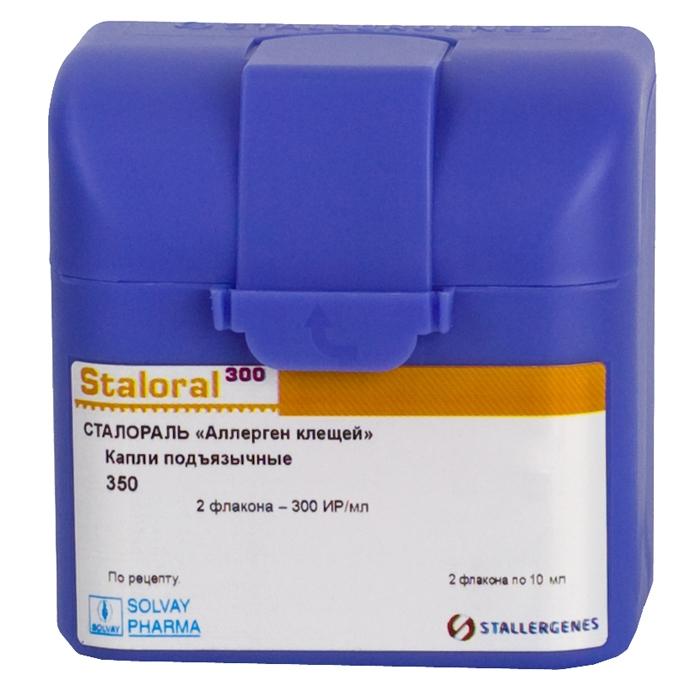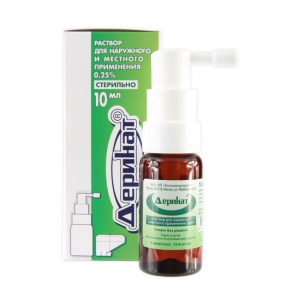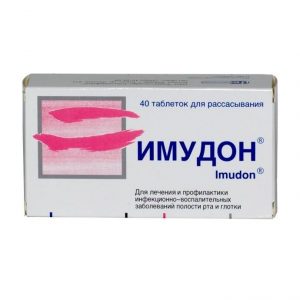Description
Packaging
2 bottles of allergen 300 TS / ml, 2 dispensers
Pharmacological action
The exact mechanism of action of the allergen during allergen specific immunotherapy (ASIT) has not been fully studied. The following biological changes are proven: the appearance of specific antibodies (IgG4), playing the role of blocking antibodies
a decrease in the level of specific IgE in plasma
a decrease in the reactivity of cells involved in the allergic reaction
an increase in the activity of interaction between Th2 and Th1, leading to a positive change in the production of cytokines (a decrease in IL-4 and an increase in -interferon), which regulate IgE production.
Conducting ASIT also inhibits the development of both the early and late phases of an immediate allergic reaction.
Indications
Allergen specific immunotherapy (ASIT) for patients with type 1 allergic reaction (IgE mediated), suffering from rhinitis, conjunctivitis, mild or moderate form of bronchial asthma, with increased sensitivity to house dust mites (D.pteronyssinus, D.farinae).
Immunotherapy can be carried out for adults and children from 5 years of age.
Contraindications
Hypersensitivity to one of the excipients (see list of excipients)
Autoimmune diseases, immunocomplex diseases, immunodeficiencies
Malignant neoplasms
Uncontrolled or severe bronchial asthma (forced expiratory flow is less than 70%)
Therapy with beta-blockers (including topical ophthalmology)
Severe inflammatory diseases of the red mucosal ulcer, for example,
Use during pregnancy and lactation
Pregnancy
Do not start ASIT during pregnancy.
If pregnancy occurs at the first stage of treatment, then therapy should be discontinued. If pregnancy arose during the period of maintenance therapy, the doctor should evaluate the possible benefits of ASIT based on the general condition of the patient.
No adverse effects reported with ASIT in pregnant women.
Breastfeeding
It is not recommended to start the course of ASIT during breastfeeding.
If a woman continues to undergo ASIT during lactation, no unwanted symptoms or reactions are expected in children.
There is no clinical data on the use of the drug during lactation.
Special instructions
If necessary, allergy symptoms should be stabilized with appropriate therapy before starting ASIT.
Patients taking ASIT should always have medications to relieve allergy symptoms, such as corticosteroids, sympathomimetic and antihistamines.
You should immediately consult a doctor if severe itching of the palms, hands, soles of the feet, hives, swelling of the lips, larynx, accompanied by difficulty swallowing, breathing, or changing the voice, occur. In these cases, the doctor may recommend taking epinephrine. In patients taking tricyclic antidepressants, monoamine oxidase inhibitors, the risk of side effects of epinephrine increases up to death. This circumstance should be considered when appointing ASIT.
In case of inflammatory processes in the oral cavity (mycoses, aphthae, gum damage, tooth extraction / loss or surgery), therapy should be interrupted until the inflammation is completely cured (at least for 7 days).
During the ASIT course, vaccination is possible after consultation with a doctor.
For patients, especially children on a diet with a reduced salt intake, it should be borne in mind that the drug contains sodium chloride (one click on the dispenser is about 0.1 ml of the drug containing 5.9 mg of sodium chloride).
When traveling, make sure that the bottle is in an upright position. The bottle should be in a box with a protective ring on the dispenser. At the first opportunity, the bottle should be placed in the refrigerator.
Composition
Active ingredient: Allergen extract from ticks Dermatophagoides pteronyssinus, Dermatophagoides farinae in equal proportions 10 TS / ml *, 300 TS / ml
Excipients: sodium chloride, glycerol, mannitol Rex * purified water * – biological standardization unit.
Dosage and administration of
ASIT is more effective when treatment is started in the early stages of the disease.
Dosage and treatment regimen
Dosage and regimen of the drug is the same for all ages, but can be changed depending on the individual reactivity of the patient.
The attending physician adjusts the dosage and treatment regimen in accordance with the possible symptomatic changes in the patient and the individual reaction to the drug.
Treatment consists of two stages: initial and maintenance therapy.
1. Initial therapy is started with daily administration of a drug with a concentration of 10 TS / ml (blue bottle cap) with a single tap on the dispenser and gradually increases the daily dosage to 10 clicks. One click on the dispenser is about 0.1 ml of the drug.
Then we proceed to daily administration of the drug at a concentration of 300 TS / ml (purple cap of the bottle), starting with one press and gradually increasing the number of clicks to the optimum (well tolerated by the patient). The first stage can last 9-21 days. During this period, the maximum dosage is achieved, individual for each patient (from 4 to 8 taps daily of a preparation of a concentration of 300 TS / ml), after which they proceed to the second stage.
Recommended initial course of ASIT:
Bottle of 10 IR / ml (blue cap)
Bottle of 300 TS / ml (purple cap)
Day
Number of clicks on the dispenser
Day
Number of clicks on the dispenser
1 srdlpp 1 srdlpp 1 1 srdlpp 1 1 srdlpp 1 1 srdlpp 1 1 srdlpp 1 1 srdlpp 1 1 srdlpp 1 1 srdlpp 1 1 srdlpp 1 1 srdlpp 1 1 srdlpp 1
2
8
2
3
4
9
4
4
6
5
8
11
srllpp 10 dose 2
10
The optimal dose achieved in the first stage of initial therapy, continue to take in the second phase of maintenance therapy.
Recommended dosing schedule: 4 to 8 taps on the dispenser daily or 8 taps 3 times a week.
Duration of treatment
Supportive therapy is recommended for 3-5 years.
If improvement does not occur after the first year of treatment, the appropriateness of ASIT should be reviewed.
How to use
Before taking the drug, make sure that: the expiration date of
has not expired, use a bottle of the correct concentration.
The drug is recommended to be taken in the morning before breakfast.
The drug should be dripped directly under the tongue and held for 2 minutes, then swallow.
Children are advised to use the drug with the help of adults.
To ensure the safety and preservation of the drug, the bottles are hermetically sealed with plastic caps and sealed with aluminum caps.
Interruption in
medication If you skip taking the medication for a long time, you should consult your doctor.
If the pass in taking the drug was less than one week, it is recommended to continue treatment without changes.
If the skipping in taking the drug was more than one week at the initial stage or with maintenance therapy, it is recommended that the treatment be performed again with one click on the dispenser, using the same concentration of the drug (as before the break), and then increase the number of clicks according to the scheme of the initial stage therapy to an optimal well-tolerated dose.
Side effects
Conducting ASIT can cause adverse reactions, both local and general.
Dosage and treatment regimen may be reviewed by the attending physician in case of an individual reaction or changes in the general condition of the patient.
Local reactions: oral: itching in the oral cavity, swelling, discomfort in the mouth and throat, impaired salivary glands (increased salivation or dry mouth)
gastroenterological reactions: abdominal pain, nausea, diarrhea.
Usually these symptoms quickly disappear, and there is no need to change the dosage and treatment regimen. In case of frequent occurrence of symptoms, the possibility of continuing therapy should be reviewed.
General reactions are rare: rhinitis, conjunctivitis, asthma, urticaria require symptomatic treatment with H1 antagonists, beta-2 mimetics, or corticosteroids (oral). The doctor should review the dosage and treatment regimen or the possibility of continuing ASIT.
in extremely rare cases, generalized urticaria, angioedema, laryngeal edema, severe asthma, anaphylactic shock are possible, which requires the cancellation of ASIT.
Rare side effects not related to IgE mediator reactions: asthenia, headache
exacerbation of preclinical atopic eczema
delayed reactions like serum sickness with arthralgia, myalgia, urticaria, nausea, adenopathy, fever, which requires cancellation
All side effects should be reported to your healthcare provider.
Drug Interactions
Do not use concomitantly with beta-blockers.
Simultaneous administration with symptomatic anti-allergic drugs (H1 antihistamines, beta-2 mimetics, corticoids, mast cell degranulation inhibitors) is possible for better tolerance of ASIT.
Overdose
In the event of exceeding the prescribed dose, the risk of side effects increases, requiring symptomatic treatment.
Storage Conditions
Store and transport at 2 to 8 ° C.
Keep out of the reach and sight of children.
Shelf life
36 months. Do not use after expiration date.
Active substance
Mite allergens
Terms and conditions
prescription
Possible product names
Staloral Allergen ticks maintenance course, bottle of 10 ml, 2 pcs.
Stallergen, France171766 i am



